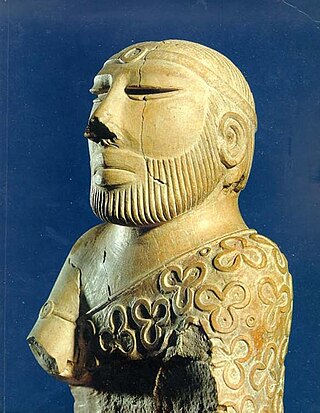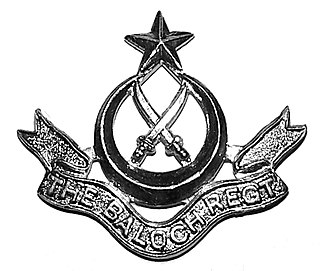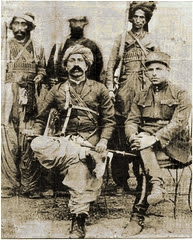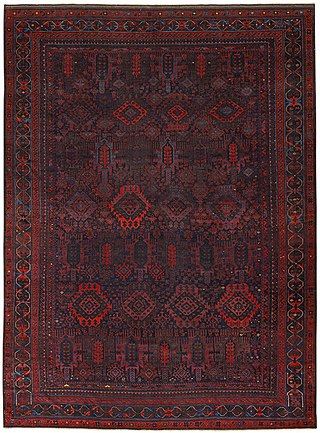
The Baloch or Baluch are a nomadic, pastoral, ethnic group which speaks the Western Iranic Baloch language and is native to the Balochistan region of South and Western Asia, encompassing the countries of Pakistan, Iran, and Afghanistan. There are also Baloch diaspora communities in neighbouring regions, including in Central Asia, and the Arabian Peninsula.

The history of Balochistan refers to the history of the Balochistan region of Pakistan, Iran and Afghanistan. Vague allusions to the region were found in Greek historical records of around 650 BCE. Prehistoric Balochistan dates to the Paleolithic.

The Khanate of Kalat was a Brahui Khanate that originated in the modern-day Kalat region of Pakistan. Formed in 1666 due to the threat of Mughal expansion in the region, it controlled the wider Balochistan at its greatest extent in the mid-18th century, extending from Kerman in the west to Sindh in the east and from Helmand river in the north to the Arabian sea in the south. The Khanate of Kalat lost considerable area to Qajar Iran and the Emirate of Afghanistan in the early 19th century, and the city of Kalat was itself sacked by the British in 1839. Kalat became a self-governing state in a subsidiary alliance with British India after the signature of the Treaty of Kalat by the Khan of Kalat and the Baloch Sardars in 1875, and the supervision of Kalat became a task of the Baluchistan Agency. Kalat was briefly independent from 12 August 1947 until 27 March 1948, when its ruler Ahmad Yar Khan acceded to Pakistan, making it one of the Princely states of Pakistan.
Mengal are a Brahui speaking clan in Balochistan, Pakistan. Mengal was originally one of the four Jat (Jadgal) tribes inhabiting Balochistan; the other three being Zehri, Bizenjo and Sajdi.
Baloch, also spelled Baloch, Beluch and in other ways, may refer to:

Balochistan is a historical region in Western and South Asia, located in the Iranian plateau's far southeast and bordering the Indian Plate and the Arabian Sea coastline. This arid region of desert and mountains is primarily populated by ethnic Baloch people.

Balochistan or Afghan Baluchistan is an arid, mountainous region that includes part of southern and southwestern Afghanistan. It extends into southeastern Iran and western Pakistan and is named after the Baloch people.

The 1973 raid on the Iraqi embassy in Pakistan was an armed infiltration carried out by Pakistan in February 1973 at the embassy of Ba'athist Iraq in Islamabad. The raid, carried out by the Pakistan Rangers and the Islamabad Police, was launched after the interception of information by Pakistani intelligence that uncovered large-scale covert Iraqi involvement in the supply of weapons and funds to militants waging an insurgency against Iran and Pakistan in the Balochistan region situated between the two countries. Following the embassy raid, an abundance of funds and Soviet armaments from Iraq that were meant for Baloch insurgents were seized by Pakistani forces, and the Iraqi ambassador to Pakistan as well as the embassy's staff were immediately expelled from Pakistan and declared personae non gratae. Pakistan's findings in the embassy raid heightened tensions between Iran and Iraq, which, in 1974, escalated into armed clashes over the Shatt al-Arab, a river that was formerly subject to a territorial dispute between the two nations that later served as one of the key factors that propelled them into a full-scale and protracted war in 1980 following the Iranian Revolution. The event led to a severe deterioration in Iraq–Pakistan relations and contributed to Pakistan's heavy backing of Iran during the latter's eight-year-long war with Iraq.

The Baloch Regiment is an infantry regiment of the Pakistan Army. The modern regiment was formed in May 1956 by the merger of 8th Punjab and Bahawalpur Regiments with the Baluch Regiment. Since then, further raisings have brought the strength of the Regiment to 27 battalions. The Baloch Regiment is descended from the infantry of the old British Indian Army and is named after Balochistan. Before 1991, it was called the Baluch Regiment but the spelling was changed to 'Baloch' to better reflect the correct pronunciation.
Kalmati or Karmati, Kalmat is a Baloch clan settled in the Balochistan and Sindh provinces of Pakistan.
Damani is a Baloch tribe in the Balochistan region which incorporates regions of Iran, Afghanistan and Pakistan. The majority of Damanis live in the Balochistan, Kerman, Khorasan and Hormongan regions of Iran, and a minority of them live in Eastern Balochistan in Southern Afghanistan and the Chagai District of the Balochistan province of Pakistan. The chief clans of Damanis are Yarahmadzai, Ismailzai and Gamshadzai.
The Baloch diaspora refers to Baloch people, and their descendants, who have immigrated to places outside the Balochistan region of South-West Asia – a region stretching from southwestern Pakistan to southeastern Iran and southern Afghanistan. The Baloch diaspora is found throughout the Middle East, South Asia, Turkmenistan, East Africa, Europe, North America and in other parts of the world.

The 10th Baluch or Baluch Regiment was a regiment of the British Indian Army from 1922 to 1947. After independence, it was transferred to the Pakistan Army. In 1956, it was amalgamated with the 8th Punjab and Bahawalpur Regiments. During more than a hundred years of military service, the 10th Baluch Regiment acquired a distinguished record amongst the regiments of the British Indian Army. Its list of honours and awards includes four Victoria Crosses.

Dost Mohammad Khan Baloch, also known as Mir Dost Muhammad Khan Baluch, was a ruler in Iranian (Western) Baluchistan from 1921 till 1928.
Tourism in Balochistan is a developing industry, and is overseen by the Tourism Directorate under the Government of Balochistan. Balochistan is known for its long coastal belt which extends from Karachi through Sonmiani, Ormara, Kalmat, Pasni, Gwadar, Jiwani and all the way up to Iran. It is also popular for its hill tops and rugged mountainous terrain.
Mugheri are a social group in Pakistan descended from Arabs. Sources claim the Mugheri are descended from a Field Marshal Mughera Bin Zaid Bin Hatim, who was appointed as a Field Marshal for Sindh by his elder brother and famous Governor of Sindh during Abbasid Caliphate named Daud Bin Zaid Bin Hatim. Daud was appointed as a Governor of Sindh in 800AD by Caliph Haroon-ur-Rashid (786-809). Governor Daud Bin Zaid Bin Hatim governed Sindh for the longest period of nine years and later his son Bashar Bin Daud Bin Hatim became the next successor Governor of Sindh during the caliphate of Mamoon-ur-Rashid. Additionally, the Mughera tribe was at the climax because they ran their business, trade, affairs and matters effectively and were considered as wealthy tribe under the Abbasid Caliphate.
The Jadgal is an Indo-Aryan ethno-linguistic group which speaks the Jadgali language. Jadgals are present in the Balochistan region of Iran and Pakistan, as well as in Oman.
The Sindhis of Balochistan are an indigenous Sindhi population living in Balochistan, Pakistan.

Balochi Rugs are a group of carpets that are woven by the Baloch tribes in Nimroz province, Sistan and Baluchistan and Khorasan in the northeast and southeast of Iran.
The Baloch of Khorasan are a group of Baloch people who settled in Khorasan. This group migrated from Balochistan to Khorasan and settled mainly in Birjand, Sabzevar, quchan, Neishabur, Sarakhs and other cities of Khorasan.









